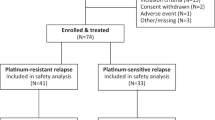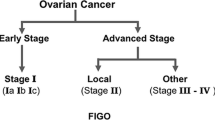Abstract
Oral etoposide has been studied in numerous clinical trials for the treatment of recurrent ovarian cancer. In different studies there has been a varied response rate, and it appears that the activity of this drug is dependent to a large part on the extent of prior therapy. On the basis of data from more than 270 patients in 9 different studies, the overall response rate is 20.4%. However, in the largest study performed by the Gynecologic Oncology Group (GOG), in which 82 previously treated patients received oral etoposide, the response rate was 30.5%. The GOG study categorised patients who received oral etoposide according to their response to initial therapy: patients were deemed either platinum sensitive or platinum resistant. No patients had received more than one prior regimen at the time they were entered into the oral etoposide trial. In 41 platinum-resistant patients, the overall response rate was 26.8%, including a 7.3% clinical complete remission rate. In patients who were platinum sensitive, the overall response rate was 34.1%, with a 14.6% clinical complete remission rate. Toxicity was acceptable, with myelosuppression being the dose-limiting toxicity. This GOG study confirms the activity of oral etoposide as second-line therapy both for platinum-resistant and platinum-sensitive ovarian cancer patients. Additional studies are in progress to determine how oral etoposide can be combined with paclitaxel and a platinum compound for use as initial therapy for previously untreated patients with advanced disease.
Similar content being viewed by others
References
Ozols RF. Update of the NCCN ovarian cancer practice guidelines. Oncology 1997; 11: 95–105
McGuire WP, Hoskins WJ, Brady MF, et al. Cyclophosphamide and cisplatin compared with paclitaxel and cisplatin in patients with stage III and stage IV ovarian cancer. N Engl J Med 1996; 334: 1–6
Stuart G, Bertelsen K, Mangioni C, et al. Updated analysis shows a highly significant improved overall survival for cisplatin-paclitaxel as first line treatment of advanced ovarian cancer: mature results of the EORTC-GCCG, NOCOVA, NCIC CTG and Scottish Intergroup Trial. Proc Am Soc Clin Oncol 1998; 17: 361A
Bookman MA, McGuire WP, Kilpatrick D, et al. Carboplatin and paclitaxel in ovarian carcinoma: a phase I study of the Gynecologic Oncology Group. J Clin Oncol 1996; 14: 1895–902
Ozols RF. Treatment of recurrent ovarian cancer: increasing options-‘Recurrent’ results [editorial]. J Clin Oncol 1997; 15: 2177–80
Markman M, Rothman R, Hakes T, et al. Second-line platinum therapy in patients with ovarian cancer previously treated with cisplatin. J Clin Oncol 1991; 9: 389–93
Eisenhauer EA, Vermorken JB, van Glabbeke M. Predictors of response to subsequent chemotherapy in platinum pre-treated ovarian cancer: a multivariate analysis of 704 patients. Ann Oncol 1997; 8: 963–8
Markman M. Prognostic factors in salvage therapy of ovarian cancer [editorial]. Ann Oncol 1997; 8: 937–8
Kavanagh J, Tresukosol D, Edwards C, et al. Carboplatin reinduction after taxane in patients with platinum-refractory epithelial ovarian cancer. J Clin Oncol 1995; 13: 1584–8
Fennelly D, Aghajanian C, Shapiro F, et al. Phase I and pharmacologic study of paclitaxel administered weekly in patients with relapsed ovarian cancer. J Clin Oncol 1997; 15: 187–92
ten Bokkel Huinink W, Gore M, Carmichael J, et al. Topotecan versus paclitaxel for the treatment of recurrent epithelial ovarian cancer. J Clin Oncol 1997; 15: 2183–93
Kudelka AP, Tresukosol D, Edwards CL, et al. Phase II study of intravenous topotecan as a 5-day infusion for refractory epithelial ovarian carcinoma. J Clin Oncol 1996; 14: 1552–7
Lund B, Hansen OP, Theilade K, et al. Phase II study of gemcitabine (2′,2′-difluorodeoxycytidine) in previously treated ovarian cancer patients. J Natl Cancer Inst 1994; 86: 1530–3
Piccart MJ, Gore M, ten Bokkel Huinink W, et al. Docetaxel: an active new drug for treatment of advanced epithelial ovarian cancer. J Natl Cancer Inst 1995; 87: 676–81
Muggia FM, Hainsworth JD, Jeffers S, et al. Phase II study of liposomal doxorubicin in refractory ovarian cancer: antitumor activity and toxicity modification by liposomal encapsulation. J Clin Oncol 1997; 15: 987–93
Hatch KD, Beecham JB, Blessing JA, et al. Responsiveness of patients with advanced ovarian carcinoma to tamoxifen. A Gynecologic Oncology Group study of second-line therapy in 105 patients. Cancer 1991; 68: 269–71
Vergote I, Himmelmann A, Frankendal B, et al. Hexamethylmelamine as second-line therapy in platin-resistant ovarian cancer. Gynecol Oncol 1992; 47: 282–6
Markman M, Hakes T, Reichman B, et al. Ifosfamide and mesna in previously treated advanced epithelial ovarian cancer: activity in platinum-resistant disease. J Clin Oncol 1992; 10: 243–8
Edmonson JH, Decker DG, Malkasian GD, et al. Phase II evaluation of VP-16-213 (NS C-141540) in patients with advanced ovarian carcinoma resistant to alkylating agents. Gynecol Oncol 1978; 6: 7–9
Slayton RE, Creasman WT, Petty W, et al. Phase II trial of VP-16-213 in the treatment of advanced squamous cell carcinoma of the cervix and adenocarcinoma of the ovary: a Gynecologic Oncology Group study. Cancer Treat Rep 1979; 63: 2089–92
Maskens AP, Armand JP, Lacave AJ, et al. Phase II clinical trial of VP-16-213 in ovarian cancer. Cancer Treat Rep 1981; 65: 329–30
Greco FA. Chronic etoposide administration: overview of clinical experience. Cancer Treat Rev 1993; 19 Suppl. C: 35–45
Rose PG, Blessing JA, Mayer AR, et al. Prolonged oral etoposide as second-line therapy for platinum-resistant and platinum-sensitive ovarian carcinomas: a Gynecologic Oncology Group study. J Clin Oncol 1998; 16: 405–10
Markman M, Hakes T, Reichman B, et al. Phase 2 trial of chronic low-dose oral etoposide as salvage therapy of platinum-refractory ovarian cancer. J Cancer Res Clin Oncol 1992; 119: 55–7
Seymour MT, Mansi JL, Gallagher CJ, et al. Protracted oral etoposide in epithelial ovarian cancer: a phase II study in patients with relapsed or platinum-resistant disease. Br J Cancer 1994; 69: 191–5
Hoskins PJ, Swenerton KD. Oral etoposide is active against platinum-resistant epithelial ovarian cancer. J Clin Oncol 1994; 12: 60–3
Hansen F, Malthe I, Krog H. Phase II clinical trial of VP-16-213 (etoposide) administered orally in advanced ovarian cancer. Gynecol Oncol 1990; 36: 369–70
Kavanagh JJ, Tresukosol D, Gonzalez De Leon C, et al. Phase II study of prolonged oral etoposide in refractory ovarian cancer. Int J Gynecol Cancer 1995; 5: 351–4
de Wit R, van der Burg ME, van den Gaast A, et al. Phase II study of prolonged oral etoposide in patients with ovarian cancer refractory to or relapsing within 12 months after platinum-containing chemotherapy. Ann Oncol 1994; 5: 656–7
Marzola M, Zucchetti M, Colombo N, et al. Low-dose oral etoposide in epithelial cancer of the ovary. Ann Oncol 1993; 4: 517–9
Garrow GC, Hainsworth JD, Johnson DH, et al. Prolonged administration of oral etoposide in previously-treated epithelial ovarian cancer: a phase II trial. Proc Am Soc Clin Oncol 1992; 11: 236A
de Jong RS, Hofstra LS, Willemse PH, et al. Effect of low-dose oral etoposide on serum CA-125 in patients with advanced epithelial ovarian cancer. Gynecol Oncol 1997; 66: 197–201
van der Velden J, Gitsch G, Wain GV, et al. Tamoxifen in patients with advanced epithelial ovarian cancer. Int J Gynecol Cancer 1995; 5: 301–5
Markman M, Blessing JA, Moore D, et al. Altretamine (hexamethylmelamine) in platinum-resistant and platinum-refractory ovarian cancer. A Gynecologic Oncology Group phase II trial. Gynecol Oncol 1998; 69: 226–9
Thigpen JT. Dose-intensity in ovarian carcinoma: hold, enough? J Clin Oncol 1997; 15: 1291–3
Author information
Authors and Affiliations
Rights and permissions
About this article
Cite this article
Ozols, R.F. Oral Etoposide for the Treatment of Recurrent Ovarian Cancer. Drugs 58 (Suppl 3), 43–49 (1999). https://doi.org/10.2165/00003495-199958003-00007
Published:
Issue Date:
DOI: https://doi.org/10.2165/00003495-199958003-00007




